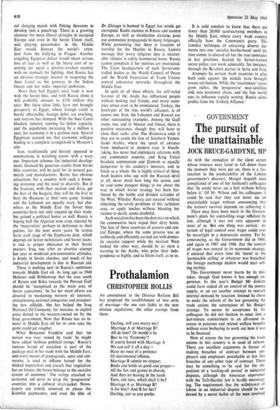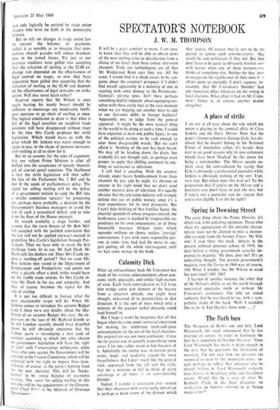The pursuit of the unattainable
GOVERNMENT JOCK BRUCE-GARDYNE, MP
As with the comedian of the silent screen whose trousers were fated to fall down from the moment they were put on, there is a fas- cination in the predictability of the Labour government's disasters. Margot Asquith once complained of one of her husband's colleagues that 'he could never see a belt without hitting below it.' Of Mr Wilson and his colleagues it could be said that they can never see an unattainable target without announcing that the nation's survival depends on achieving it.
There may have been merit in the Govern- ment's plans for controlling wage inflation by law, although it. was not very apparent to most of us. But one thing was certain : no system of legal control over wages could ever be watertight in a democratic society. Yet by announcing, as the Government did in 1966, and again in 1967 and 1968, that the control of wages was central to its economic strategy, it ensured that every- time the 'norm' or the 'permissible ceiling' or whatever was breached, the foreign exchange dealers would start sell- ing sterling.
This Government never learns by its mis- takes, though God knows it has enough ex- perience. In this year's Budget Mr Jenkins could have staked all on control of the money supply, or on yet another attempt to restrain internal demand by taxation. Instead he chose to make the reform of the law governing the trade unions the centrepiece of his Budget strategy. To secure its acceptance by his colleagues he did not hesitate to enter into a last-minute commitment to an all-round in- crease in pensions and related welfare benefits without even bothering to work out how it was to be financed.
Now of course the law governing the trade unions in this country is in need of reform. There are excellent arguments in favour of making breaches of contract between em- ployers and employees punishable at law like breaches of any• other type of contract. There may be something to be said for the im- position of a 'cooling-off period' in industrial disputes, although the American experience with the Taft-Hartley law is hardly encourag- ing. The requirement that the withdrawal of labour in an industrial dispute should be en- dorsed by a secret ballot of the men involved
can only logically be resisted by trade union leaders who have no faith in the democratic process. But to rely on changes in trade union law to correct the balance of payments deficit is as sensible as to imagine that com- pulsory church parades will reduce drunken- ness in the armed forces. Yet just as our overseas creditors were gulled into accepting that the salvation of sterling at the $2.80 ex- change rate depended on the effectiveness of legal control on wages, so now they have apparently been gulled into accepting that the salvation of sterling at the $2.40 rate depends on the effectiveness of legal restraints on strike action. Will they never learn either?
Inspired reports that Mr Wilson is once again beating his manly breast should be sufficient to encourage any moderately intelli- gent operator to go short of sterling at once.
The logical conclusion to draw is that what is left of the legal penalties on recidivist trade unionists will have disappeared without trace by the time Mrs Castle produces her strife legislation. Which would leave us with the
price which Mr Jenkins was naïve enough to agree to pay, in the shape of pension increases, with nothing at all to show for it..
But let us assume, for the sake of argument, that our valiant Prime Minister is after all bullied into the acceptance of (purely theoreti- cal, of course) penal sanctions. The likelihood is that the strife legislation will then suffer the fate of the Parliament No. 2 Bill and be lost in the sands of parliamentary delay. The signal for selling sterling will be the defeat of a government motion to send the Bill into a smaller committee 'upstairs' for processing (or, perhaps more probably, a decision by the Government's business managers to avoid the risk of such a procedural defeat; and to take it on the floor of the House anyway).
Or stretch credulity a stage further, and assume that the stern threats of Mr Bob Mel- lish (coupled with the justified conviction that the law will not be applied anyway) succeed in propelling Mrs Castle's legislation through Par- liament. Then we have only to await the first challenge from, let us say, Mr Jack Dash. Mr Dash calls his dockers out. Does Mrs Castle im- pose a 'cooling-off period'? Not on your life.
Roy Jenkins nips round to the Department of Employment and Productivity and points out what a ghastly effect a dock strike would have on the visible trade returns. So Mrs Castle in- vites Mr Dash in for tea and sympathy. And that, of course. becomes the signal for the sale of sterling It is not too difficult to foresee what the next unattainable target will be. When Mr Jenkins comes to introduce his autumn Budget (and if there were any doubts about the like- lihood of an autumn Budget this year. the ex- pression on the face of Mr Richard Goode as he left London recently should have .dispelled them) he will obviously announce that the
labour party is introducing a new code of Conduct according to which MPS who abstain on government legislation will have the right to 'pair' with Conservatives withdrawn, while three who vote against the Government will be referred to the l iaison Committee, which will be endowed with he right to impose fines (con- tributed, of course. to the party's fighting fund for the next election). This will be 'funda- mental' to hi.. entire balance of payments strategy. The :terml for selling sterling in this instance will be the appointment of the Govern- ment Chief %I'll:- •n the Ministry of Overseas Develoorn,







































 Previous page
Previous page